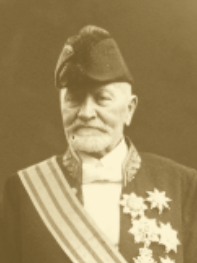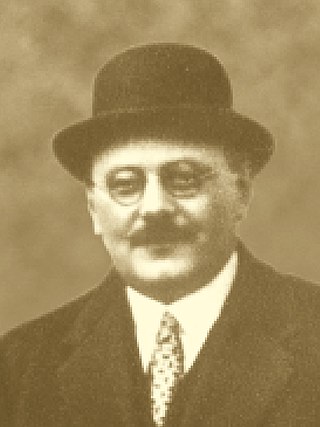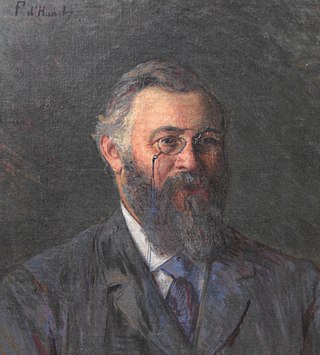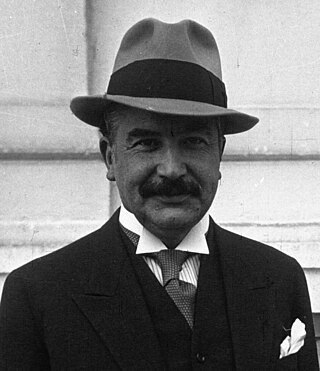
Marie-Adélaïde, reigned as Grand Duchess of Luxembourg from 1912 until her abdication in 1919. She was the first Grand Duchess regnant of Luxembourg, its first female monarch since Duchess Maria Theresa and the first Luxembourgish monarch to be born within the territory since Count John the Blind (1296–1346).
Elections in Luxembourg are held to determine the political composition of the representative institutions of the Grand Duchy of Luxembourg. Luxembourg is a liberal representative democracy, with universal suffrage guaranteed under its constitution. Elections are held regularly, and are considered to be fair and free.

The Chamber of Deputies, abbreviated to the Chamber, is the unicameral national legislature of Luxembourg. Krautmaart is sometimes used as a metonym for the Chamber, after the square on which the Hôtel de la Chambre is located.

The National Union Government was a form of national government headed by Victor Thorn that governed the Grand Duchy of Luxembourg between 24 February 1916 and 19 June 1917, at the height of the First World War. At the time, Luxembourg was occupied by the German Empire, but the occupying Germans had promised not to interfere in the country's political machinations, provided that the Luxembourgish government did not aid Germany's enemies. Nonetheless, political life was dominated by the crisis that had enveloped Europe.

Hubert Loutsch was a Luxembourgish politician. He was the tenth Prime Minister of Luxembourg, serving for 16 weeks from 6 November 1915 until 24 February 1916.

Léon Kauffman was a Luxembourgish politician. He was the 12th Prime Minister of Luxembourg, serving for one year, from 18 June 1917 until 28 September 1918.

Émile Reuter was a Luxembourgish politician. He was the 13th Prime Minister of Luxembourg, serving for six years, from 28 June 1918 until 20 March 1925.

Pierre Prüm was a Luxembourgian politician and jurist. He was the 14th Prime Minister of Luxembourg, serving for a year, from 20 March 1925 until 16 July 1926.
The Party of the Right, abbreviated to PD, was a political party in Luxembourg between 1914 and 1944. It was the direct predecessor of the Christian Social People's Party (CSV), which has ruled Luxembourg for all but fifteen years since.

From August 1914 until the end of World War I on 11 November 1918, the Grand Duchy of Luxembourg was under full occupation by the German Empire. The German government justified the occupation by citing the need to support their armies in neighbouring France, although many Luxembourgers, contemporary and present, have interpreted German actions otherwise.

Dr. Michel Welter was a Luxembourgian politician, and former leader of the Socialist Party. A member of Luxembourg's Chamber of Deputies, he served as the Director-General for Agriculture, Commerce, and Industry from 24 February 1916 until 3 January 1917, during the German occupation.
Émile Servais was a Luxembourgian left liberal politician. He was an engineer by profession.
The Constitution of Luxembourg is the supreme law of the Grand Duchy of Luxembourg. The modern constitution was adopted on 17 October 1868.
François Altwies was a Luxembourgian politician. He sat in the Chamber of Deputies, of which he served as President from 1917 until 1925.

The Prüm Ministry took office in Luxembourg on 20 March 1925. It was formed after the Chamber elections of 1 March 1925 and was supported by the Independent National Party, the Liberals, the Socialists and elements of the Party of the Right. It resigned on 16 July 1926, as the Liberals and Socialists could not agree over a bill for workers' holiday.

The Bech Ministry was the government of Luxembourg that came into office in Luxembourg on July 16, 1926 after the resignation of the Prüm Ministry, and was headed by Joseph Bech. It was reshuffled on April 11, 1932 and on December 27, 1936. It stepped down after the referendum on the so-called Maulkuerfgesetz, in which the majority of voters decided against the law.
The Loutsch Ministry was in office in Luxembourg from 6 November 1915 to 24 February 1916.
The Reuter Ministry was the government in office in Luxembourg from 28 September 1918 until 20 March 1925. It resulted from the Chamber elections of 28 July and 4 August 1918 and was reshuffled on 5 January 1920 as a result of the elections of 26 October 1919. There was a further reshuffle on 15 April 1921, when the Liberals left the government.
The Maulkuerfgesetz was a proposed 1937 law in Luxembourg. Officially, it was entitled the "Law for the Defence of the Political and Social Order" but was nicknamed Maulkuerfgesetz by its opponents. The law would have allowed the Luxembourgish government to ban the Communist Party and dissolve any political organisation which they believed might endanger the constitutional institutions. The members of these parties or organisations would be stripped of their political offices and could not be employed by the state or by local governments.










